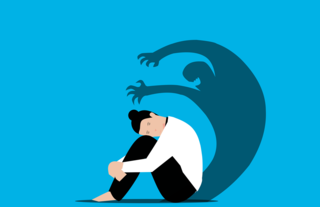
A row of light bulbs with only one lit up
Source: Colin Behrens/Pixabay
The neurodiversity movement that began in the 1990s aims to seek equality, respect, and societal inclusion for those who are neurodivergent or whose minds differ from the societal standard.
This movement has gained more traction in the last decade through the increased connectivity offered by social media platforms. Now, mental health counselors and their clients are getting curious about the overlap between certain mental health conditions and neurodivergence.
Researchers are exploring the correlation between neurodivergent individuals and eating disorders. Neurodivergent individuals may experience symptoms that increase their risk of disordered eating, such as sensory sensitivities or trouble connecting with bodily hunger cues.
What is neurodivergence?
Neurodiversity and neurodivergence are terms commonly used interchangeably, although they have different implications. Neurodiversity is an inclusive term. The term acknowledges that, just as there are many variations in hair and eye color, there are variations between people’s brains.
Neurodivergence is a term of exclusion used for individuals whose minds work differently from what society has deemed the standard. Neurodivergent individuals may experience differences in how they interpret, experience, and digest the world around them.
Think of it this way. Everyone can be neurodiverse, but not everyone is neurodivergent.
Examples of Neurodivergence

A group of red chess pieces and one brown chess piece standing alone
Source: Markus Spiske/Pexels
It is important to note that “neurodivergent” is not a medical term. Neurodivergent is a way to describe individuals whose minds work differently from the established norm. There isn’t one single way to describe what is “normal” and what is “abnormal” within the human experience. This means there are countless ways to interpret how individuals display neurodivergence.
Below is a list of some common diagnoses associated with neurodivergence. However, remember that neurodivergence is an umbrella term that covers a broad spectrum of lived experiences. Therefore, this list is not exhaustive.
Attention-deficit/hyperactivity disorder (ADHD)
Autism spectrum disorder (ASD)
Dyslexia
Tourette’s syndrome
Synesthesia
Other learning/developmental disabilities
Other mental health disorders
What is an Eating Disorder?
Eating disorders cause a disturbance in an individual’s eating behavior. There are many misconceptions about what eating disorders look like, so it is important to note that the disturbance with eating may be caused by several things and is not solely indicative of an individual’s concern about their weight or appearance.
Eating disorders are significant mental illnesses associated with impaired psychological, emotional, and physical functioning and can’t be spotted based on a person’s outward appearance. Due to these illnesses’ complexity, poor treatment access and outcomes, and a lack of early intervention, eating disorders are the second deadliest mental illnesses.
In the fifth edition of the Diagnostic and Statistical Manual of Mental Disorders (DSM-5), the terminology was changed from “Eating Disorders” to “Feeding and Eating Disorders” to help incorporate all eight manifestations of eating disruptions. Below is a list of the eight different feeding and eating disorders recognized by the DSM-5.
Anorexia nervosa
Bulimia nervosa
Binge eating disorder
Avoidant or restrictive food intake disorder
Pica
Rumination
Other specified feeding and eating disorders
Unspecified feeding and eating disorders
The Overlap Between Neurodivergence and Eating Disorders

Women curled up with angry shadow hovering overtop of her
Source: Mohamed Hassan/Pixabay
Research is beginning to show there is a significant overlap between neurodivergence and those struggling with eating disorders.
Eating Disorders Essential Reads
These are just a few of the many research studies proving a significant overlap between neurodivergent individuals and eating disorders. Though many factors contribute to the development of an eating disorder, this suggests that neurodivergence puts individuals at an increased risk. This may be due to the increased rates of bullying, low self-esteem, and societal isolation reported by neurodivergent individuals.
Why Should Mental Health Counselors Care?
Counselors should educate themselves on the factors contributing to the diagnostic overlap between neurodivergent individuals and eating disorders so as to provide inclusive, identity-affirming support to their clients. Neurodivergent individuals live in a world designed for neurotypical people, which requires them to constantly adapt to the world around them. This can be an exhausting process.
Counselors should consider whether a traditional approach to treating eating disorders is most effective or appropriate. If counselors are aware of neurodivergent individuals’ unique challenges, they could offer an individualized approach to treatment where neurodivergent individuals don’t have to adapt to a neurotypical framework.
There are many ways in which counselors can further educate themselves on this topic, such as:
Reading about neurodivergence.
Studying the recent research regarding neurodivergence and eating disorders.
Attending training or webinars on identity-affirming care.
Getting creative.
Think outside the box of traditional treatment approaches for eating disorders.
Take Away
Neurodivergence has become an increased topic of conversation among mental health providers and their clients, sparking curiosities about the overlap of mental health disorders and neurodivergence. Recent research shows neurodivergent individuals are at an increased risk of developing an eating disorder. Counselors should seek further education on this topic to be prepared to offer identity-affirming, supportive treatment to these clients.

